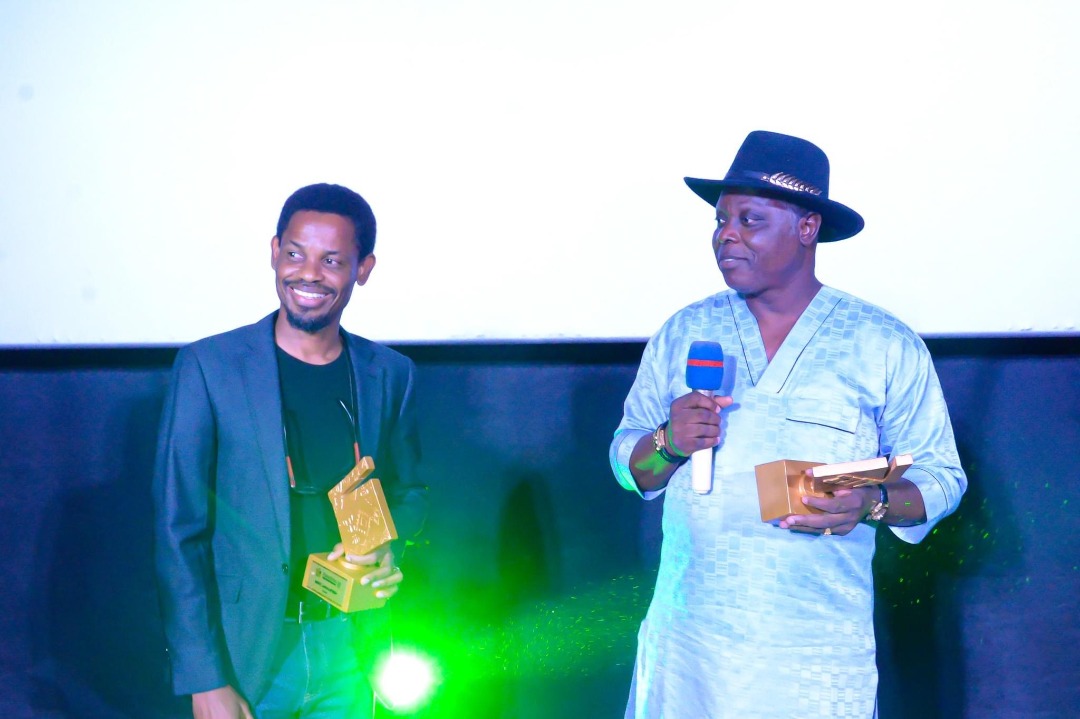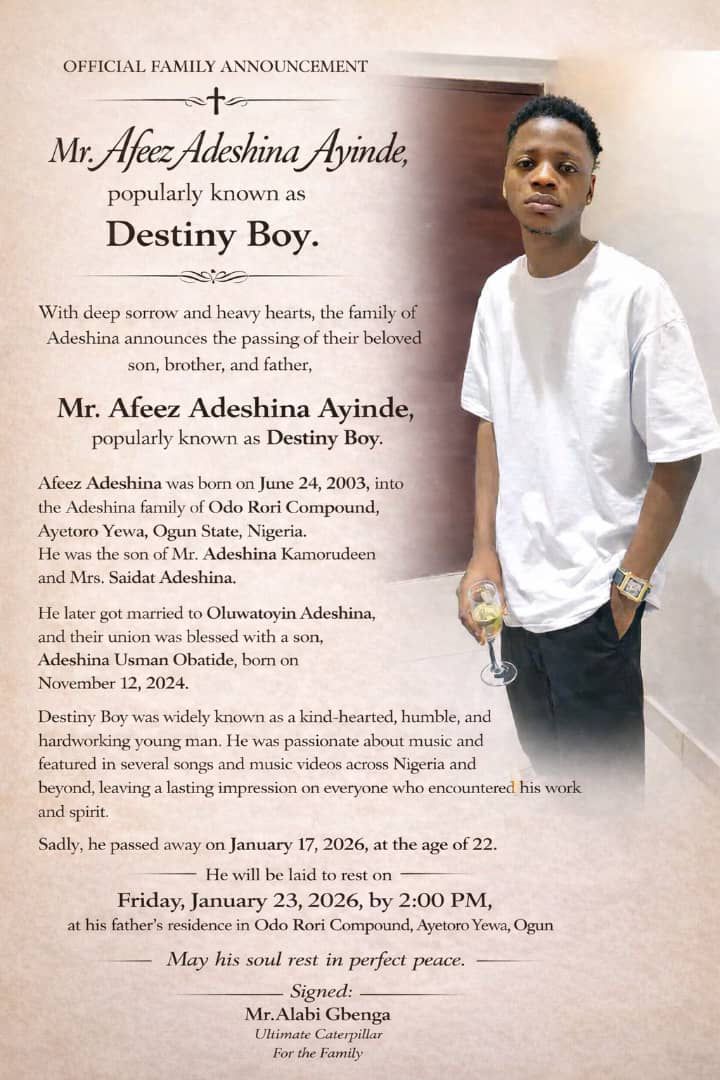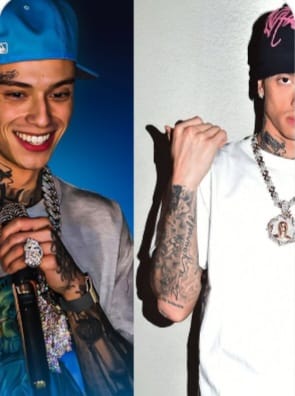Entertainment
Ibadan International Film Festival: Venture Government, Private Sector Must Embrace’ – Prof. Tunji Azeez

Ibadan International Film Festival: Venture Government, Private Sector Must Embrace’ – Prof. Tunji Azeez
Glizt, Glamour as Ibadan International Film Festival Rekindles Ibadan as City of Art, Culture, and Entertainment
Globally, the impact of film making cannot be underrated. Apart from the fact that it can be used build positive societal values, its contribution to unite people in a common sense of humanity and shared responsibility gives it power to foster positive changes and developments in any given society, as it can reach a wide audience to inform and inspire change through engaging audiences and reflecting society.
Economically, film making industry in Nigeria has continued to break barriers, grossing millions in dollars as it is being watched globally.
According to PwC Global Entertainment and Media Outlook for 2020-2024, Nigeria’s media and entertainment industry is one of the fastest-growing creative industries in the world. It has the potential to become the country’s greatest export, with a projected annual growth rate of 8.6% and a compound annual growth rate (CAGR) of 19.3% from 2018-2023.
The report further pointed that the Nigeria’s film industry in 2021 contributed 2.3% and about 239 billion naira ($660 million) to GDP and projects that the industry will increase its export revenue earnings to over $1 billion.
For much of these efforts to be appreciated and further inform the society on the contributions the industry is making to the Nigerian economic and national landscape, major Nollywood stakeholders gathered in Ibadan last week under the platform of Ibadan International Film Festival.
As it was set out, the international festival was a three-day event that gathered major film making players and stakeholders from different institutions to entertain and educate people about films.
The Festival Convener, Usman “Blackky” Ogunlade said that the festival was born out of the idea of putting Ibadan back to its old status of been the cradle of entertainment in Africa which was driven by WNBS/WNTV which later became Nigerian Television Authority.
Ogunlade said the birth of NTA have birth to the beginning of filmmaking Africa.
In his word, “We set out not for a local film festival but an international film festival because of the status of Ibadan in the World Map. We created an avenue where we can bring the World to Ibadan and also take Ibadan to the world using filmmaking/entertainment.”
The event which started on Thursday with workshops on film making was facilitated by Ehizojie Ojesebholo, popular filmmaker known as Jimi Bendel; Godwin Lawani, and Charles Oleghe.
The second day of the event featured workshops on Directing for Film/TV which was facilitated by Niji Akanni; Producing for Film/TV by James Omokwe and Jemila Akinwale and Sound Design for Film/TV was facilitated by Segun “Ebonie” Osisanya.
This day also screened selected films which were wrapped with an ‘Art Hang Out’ that was supported by the prominent art Curator/Collector – Prince Tunde Odunlade of Tunde Odunlade Arts and Culture.
The last day of the festival featured film screenings and seminar that had the top key players in the business of filmmaking in Nigeria, Biodun Stephen, Olaleken Wasiudeen of LibraTV, Femi Ogunsanwo and Adeleye Fabusoro of the popular family series – Awon Aladun.
In his keynote address, Lagos State University’s Professor of Theatre, Film and Cultural Studies, Professor Tunji Azeez identified the role corporate sponsorship play in event like Ibadan International Film, saying that any nation, such as Nigeria that refuses to consciously and intentionally invest in art, culture and filmmaking does so at its own peril.
The former Acting Head of Department of Theatre Arts and Music of the institution lamented that successive Nigerian governments have not woken up to this reality in over hundred years of the industry existence.
Professor Azzez emphasized that the birth of Ibadan International Film Festival should be seen as a venture that we all, particularly the government must embrace, pointing that government must put structures and policies in place to guarantee that it is a permanent festival.
“Now, let me add that beyond coming to deliver a keynote address at this maiden festival, I am a bonafide son of Oyo state with a passion for the state and the arts and culture sector generally. For this reason, I must emphasize that if we get this right, Ibadan and Oyo state will have cause to attract investors that will impact positively on our people and our culture.”, he said.
The festival received over 10000 entries from over 117 Countries across the world for different categories of awards which went through rigorous screening by the college of screeners and panel of jury which comprises renowned filmmakers and scholars within and outside Nigeria.
How to Tie a Tie won the Best Screenplay; Leiying Luan in Medea won the Best Actor (Female); Badmus Ibironke in Sky Pie won the Best Supporting Actor (Female); Gerard Depardieu in Umami won the Best Actor (Male); Pierre Richard in Umami won the Best Supporting Actor (Male); Favour Eraikhuvwmem in Baba won the Best Child Actor, while Kiryane Ahmad won the Best Child Actor (Male) in “Merlich Merlich.
From Trash To Treasure won the Best Editing; Potato won the Best Short Film; Ami won the Best Nigerian Film; Impossible Love won the Best Cinematography; Mummy Is Not Fine won Best Sound Design; Merlich Merlich won the Best Student Film and Ami won the Best Animation
Other movies that had honourary mentions were Kiitan , Midnight Gift, Invisible Manners; Urgent News Bulletin and Archibald Syndrome.
Entertainment
From Drill to Deen: Central Cee’s Conversion and the Power of Faith in Modern Hip-Hop

From Drill to Deen: Central Cee’s Conversion and the Power of Faith in Modern Hip-Hop
By George Omagbemi Sylvester
“The British rap star’s public declaration of Islam sparks global reactions and renews debate about spirituality, identity, and influence in contemporary music.”
British rap superstar Central Cee has publicly announced that he has converted to Islam, a revelation that has rapidly spread across global media and social platforms, drawing reactions from fans, cultural commentators and religious observers alike. The development marks a deeply personal shift for one of the most influential voices in modern UK drill, and it highlights the growing intersection between faith, identity and popular culture.
Central Cee, whose real name is Oakley Neil Caesar-Su, disclosed the decision during a recent livestream, where he stated that he had taken the Shahada, the Islamic declaration of faith that formally marks a person’s conversion to Islam.
According to multiple reports published on February 6, 2026, the rapper confirmed the conversion publicly, saying he had changed his name and embraced Islam, with friends present during the broadcast congratulating him.
The announcement quickly became a trending global topic, with thousands of fans flooding social media with messages of support and congratulation.
What happened, when, where and how
The confirmed facts are straightforward.
What happened: Central Cee announced his conversion to Islam.
Who: The British rapper, born Oakley Neil Caesar-Su.
When: The announcement surfaced publicly on or around February 6, 2026.
Where: The declaration was made during a livestream, widely circulated online.
How: He confirmed he had taken the Shahada and embraced Islam, with friends present during the session.
Before this announcement, Central Cee had never publicly declared adherence to any specific religion, though fans had long speculated about his spiritual leanings.
Background: the rise of a global rap force
Born on June 4, 1998, in London, Central Cee rose from the streets of Shepherd’s Bush to become one of the most commercially successful British rappers of his generation.
He achieved mainstream recognition with his 2020 single Day in the Life and later dominated charts with hits such as Doja and Sprinter, accumulating billions of streams worldwide.
By the mid-2020s, he had become a defining figure in UK drill, blending street narratives with a polished, globally accessible sound.
Reactions and significance
The news of his conversion triggered widespread reaction across continents. Many fans congratulated him, using phrases such as “Welcome to Islam, brother,” reflecting the celebratory tone among supporters.
Others expressed curiosity about whether the decision would influence his music, public image, or future lyrical direction.
Cultural analysts note that religion has long played a quiet but significant role in hip-hop. From Malcolm X’s influence on American rap consciousness to the presence of Muslim artists in both US and UK scenes, faith has often shaped artistic identity.
British sociologist Dr. Reza Pankhurst, writing on religion and youth culture, has argued that for many urban artists, faith offers “a language of discipline, moral structure and belonging in environments often defined by instability.”
Similarly, American scholar Dr. Sherman Jackson has noted that Islam’s appeal among musicians and athletes lies partly in its “emphasis on personal responsibility, spiritual dignity, and community.”
While these are broader observations about religious influence in culture, they help explain why high-profile conversions often resonate far beyond the personal sphere.
Why the announcement matters
Central Cee is not merely another celebrity; he is one of the most commercially powerful voices in British rap, with global reach across Europe, Africa, Asia and North America. His decisions, therefore, carry symbolic weight.
When artists of such stature publicly embrace a faith, it often triggers three parallel conversations:
First, identity: Fans begin to examine how the artist’s beliefs align with their lyrics and public persona.
Second, influence: Younger audiences may view the decision as aspirational or spiritually significant.
Third, authenticity: Critics and supporters alike debate whether faith will reshape the artist’s artistic content.
British cultural commentator Kehinde Andrews has previously observed that hip-hop is “not just music but a social language through which young people negotiate power, race, faith and identity.”
In that sense, Central Cee’s announcement becomes part of a larger cultural dialogue not merely a personal declaration.
The question of a new name
Some reports indicate that the rapper mentioned changing his name after taking the Shahada, though details remain inconsistent across sources.
While certain online reports suggested possible new names, there is no universally confirmed official new name from the artist at the time of reporting.
This remains an evolving aspect of the story, and responsible reporting requires caution until a formal statement is released through verified channels.
The broader context: faith and hip-hop
Central Cee joins a growing list of artists who have publicly embraced Islam. Over the decades, figures such as Yasiin Bey (Mos Def), Lupe Fiasco, Ice Cube, and Q-Tip have either converted to Islam or drawn heavily from Islamic teachings in their music.
In the UK, Muslim identity has long been intertwined with the grime and drill scenes, reflecting the multicultural realities of cities like London, Birmingham and Manchester.
Cultural historian Tricia Rose, one of the foremost scholars of hip-hop, once wrote that the genre “has always been a site of spiritual searching, moral struggle and social commentary.”
In that context, a public conversion is not an anomaly but part of a longstanding tradition of artists seeking meaning beyond fame and commercial success.
What remains unclear
Despite the viral spread of the story, certain details are still evolving:
The exact location of the livestream has not been formally confirmed.
The identity of the individuals present during the Shahada has not been publicly verified.
Any official legal name change has not been documented in confirmed public records.
Responsible journalism requires distinguishing between verified facts and social-media speculation.
Final assessment
Central Cee’s conversion to Islam is a deeply personal decision that has nonetheless sparked global conversation. Announced during a livestream in early February 2026, the declaration places one of Britain’s most influential rappers at the centre of a broader discussion about faith, culture and celebrity influence.
In an era where artists are often defined solely by streaming numbers and chart positions, his announcement underscores a different narrative: the search for meaning, identity, and spiritual grounding in the midst of global fame.
As the late scholar James Cone once wrote, “Spiritual transformation is the most radical form of social change, because it begins inside the human soul.”
Whether Central Cee’s journey will reshape his music or remain a private source of guidance is a question only time can answer. What is certain, however, is that his decision has already stirred conversations that extend far beyond the world of rap.
Entertainment
Remembering Afeez Adeshina “Destiny Boy” : A Life of Promise, Music, And Quiet Impact ~ 1ST ELEVEN9JA TV

Remembering Afeez Adeshina “Destiny Boy” : A Life of Promise, Music, And Quiet Impact ~ 1ST ELEVEN9JA TV
By Alhaji Arems (Baba Fuji)
The Nigerian music scene is mourning the loss of Afeez Adeshina Ayinde, popularly known as Destiny Boy, whose passing has left a deep sense of grief among family, friends, and fans. Though his life was brief, his story is one marked by determination, creativity, and a steady rise driven by passion rather than noise. Destiny Boy passed away on January 17, 2026, at the age of 22, cutting short a journey that many believed was only just beginning.
Early Life And Background :
Afeez Adeshina was born on june 24, 2003, into the Adeshina family of Odo Rori Compound, Ayetoro Yewa, Ogun State, Nigeria. He was the son of Mr. Adeshina Kamorudeen and Mrs. Saidat Adeshina, raised within a close-knit family environment that shaped his values and character.
From an early age, Afeez was known for his calm demeanor and respectful nature. Those who grew up around him often describe him as gentle, focused, and quietly ambitious. Music became an outlet through which he expressed himself, long before public recognition followed. What began as interest and experimentation gradually turned into purpose.
Music Career And Creative Journey :
Known professionally as Destiny Boy, Afeez carved out his place in music through persistence rather than spectacle. He was deeply passionate about his craft and committed to growth, often collaborating and featuring in songs and music videos across Nigeria and beyond.
While he may not have been the loudest voice in the room, Destiny Boy earned respect for his work ethic and humility. He approached music with seriousness, seeing it not just as entertainment but as a path to building something meaningful. Colleagues and collaborators consistently describe him as hardworking, disciplined, and eager to learn — traits that set him apart in an industry often defined by fast success and fleeting attention.
His presence in multiple projects across different platforms reflected a steady upward movement. For many young creatives, Destiny Boy represented the quiet grind: showing up, improving, and letting the work speak.
Family Life And Personal Milestones :
Beyond music, Afeez embraced responsibility early in life. He got married to Oluwatoyin Adeshina, and their union was blessed with a son, Adeshina Usman Obatide, born on November 12, 2024. Becoming a husband and father added new depth to his life, grounding him further and reshaping his priorities.
Those close to him speak of his devotion to family and his desire to build a stable future. Balancing personal life with creative ambition was not always easy, but Afeez carried these responsibilities with maturity well beyond his years.
His Passing :
The news of Destiny Boy’s death on January 17, 2026, came as a shock to many. At just 22 years old, his passing raised a collective sense of loss — not only for what he had achieved, but for the potential that remained unrealized.
While details surrounding his death have been kept private, the impact has been deeply felt across his immediate community and within creative circles. Tributes have highlighted not only his music but his character: kind-hearted, respectful, and sincere.
Burial Arrangements :
The Adeshina family has announced that Afeez Adeshina Ayinde (Destiny Boy) will be laid to rest on:
Friday, January 23, 2026 :
Time : 2:00 PM
Venue : His father’s residence, Odo Rori Compound, Ayetoro Yewa, Ogun State
Family members, friends, colleagues, and well-wishers are expected to gather to pay their final respects and celebrate a life that, though short, left a meaningful imprint.
A Legacy Beyond Numbers :
Destiny Boy’s story is not one measured by chart positions or awards, but by consistency, humility, and quiet influence. He represented a generation of young Nigerian creatives navigating ambition, responsibility, and identity in real time.
In remembering Afeez Adeshina, many will recall a young man who showed up for his craft, valued his family, and treated people with respect. His journey serves as a reminder that impact is not always loud — sometimes, it is built patiently, one step at a time.
As he is laid to rest, his music, memories, and the lives he touched remain.
May his soul rest in perfect peace.
Entertainment
Benin Summit Group Congratulates Rema, Shallipopi for Flying the Benin Flag at AFRIMMA Awards

Benin Summit Group Congratulates Rema, Shallipopi for Flying the Benin Flag at AFRIMMA Awards
The Chairman-in-Council of the Benin Summit Group, Earl Osaro Onaiwu, has congratulated celebrated music stars Rema and Shallipopi for their outstanding achievements at the recently concluded AFRIMMA Awards, where they emerged as shining ambassadors of the Benin Kingdom on the global entertainment stage.
Rema, ( Divine Justice Ikubor) the internationally acclaimed Afrobeats sensation of Benin extraction, carted home three prestigious awards, while fast-rising artiste Shallipopi ( Crown Uzama) also clinched one award, marking a moment of pride not just for Edo State but for the entire Benin Kingdom.
In a statement issued by the Benin Summit Group, Osaro Onaiwu described their victories as a powerful demonstration of Benin excellence, creativity, and global relevance.
“I commend and congratulate Rema and Shallipopi for putting the Benin Kingdom firmly in the global space through their talent, hard work, and discipline. Their achievements are a source of pride to our people and an inspiration to our youths,” Onaiwu said.
He noted that the success of Benin sons in the global entertainment industry reinforces the importance of nurturing creativity and supporting young talents across music, film, fashion, and other creative arts.
“These accomplishments show what is possible when talent meets opportunity and determination. Benin land is rich in creativity, and the world is beginning to take notice,” he added.
Osaro Onaiwu further urged other Benin sons and daughters, particularly those in the creative and entertainment sectors, to remain focused and strive for excellence, emphasizing that global recognition comes through consistency, hard work, and commitment to craft.
“I urge others to strive harder to excel. Let the achievements of Rema and Shallipopi motivate the next generation to dream bigger, work harder, and represent Benin with dignity and pride wherever they find themselves,” he said.
He reaffirmed the commitment of the Benin Summit Group to promoting unity, culture, and development, including the creative arts, which he described as a powerful tool for projecting the Benin heritage and identity to the world.
According to Onaiwu, celebrating the successes of Benin sons and daughters across various fields remains central to the group’s mission of fostering unity, pride, and collective progress within the Benin Kingdom and the diaspora.
-

 celebrity radar - gossips6 months ago
celebrity radar - gossips6 months agoWhy Babangida’s Hilltop Home Became Nigeria’s Political “Mecca”
-

 society6 months ago
society6 months agoPower is a Loan, Not a Possession: The Sacred Duty of Planting People
-

 society5 months ago
society5 months agoReligion: Africa’s Oldest Weapon of Enslavement and the Forgotten Truth
-

 news6 months ago
news6 months agoTHE APPOINTMENT OF WASIU AYINDE BY THE FEDERAL GOVERNMENT AS AN AMBASSADOR SOUNDS EMBARRASSING








